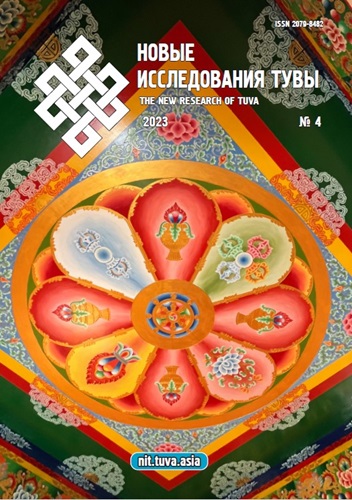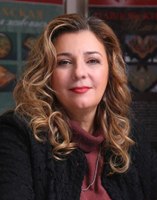The source of folk pedagogy and the potential of language education
DOI:
https://doi.org/10.25178/nit.2023.4.15Keywords:
review; Tuvan studies; Dagylga; Tuva; Tuvans; folk pedagogy; religious revivalAbstract
The present article, framed within the genre of a review, critically examines the pedagogical potential and significance encapsulated in the popular science publication titled “Dagylga: Tuvan Rituals of Consecration in the 21st Century” (Kyzyl, 2021), authored by a team led by Ch. K. Lamazhaa. Primarily intended for their fellow countrymen and compatriots, the Tuvans, the publication aims to disseminate invaluable insights capable of enriching their Dagylga ritual practices through borrowings and clarifications. Noteworthy is the fact that the book is available in both Russian and Tuvan languages, underscoring its accessibility and relevance to the indigenous audience.
The author of the review emphasizes the scholarly significance of the conducted research, extending beyond the realms of Tuvan studies, ethnography, and the historical narrative of the diverse peoples within the Russian Federation. The reviewer particularly accentuates the research's scientific and pragmatic value in the context of ethno-pedagogy and linguistic (bilingual) education. The outcomes derived from the endeavors of Tuvan scholars pique the interest of educational facilitators, practical educators, and linguistic researchers alike. The incorporation of a bilingual text, a specialized glossary elucidating technical terminology, accompanying photographs capturing the diverse Tuvan clans performing Dagylga rituals, meticulous citations, and QR codes providing direct access to pertinent video materials, collectively underscore the comprehensive and innovative approach adopted towards the subject and object of the research.
This multifaceted methodology proves instrumental, especially concerning the pedagogical engagement with students born in the digital age. As society traverses the era of digital technologies, these meticulous scholarly efforts become indispensable in fostering a nuanced understanding of Tuvan cultural practices and heritage.
References
Arefiev, A. L., Bakhtikireeva, U. M. and Sinyachkin, V. P. (2021) Problemy bilingvizma v sisteme shkol'nogo iazykovogo obrazovaniia Respubliki Tyva [Bilingualism in language education in secondary schools of the Republic of Tuva]. New Research of Tuva, no. 1, pp. 255–272. (In Russ.). DOI: https://doi.org/10.25178/nit.2021.1.14
Bakhtikireeva, U. M. and Valentinova, O. I. (2022) Osobennosti «iazykovogo myshleniia» s pozitsii sistemnoi lingvistiki [“Language thinking” from the perspective of systemic linguistics]. Russian Journal of Linguistics, vol. 26, no. 1, pp. 224–244. (In Russ.). DOI: https://doi.org/10.22363/2687-0088-30149
Bitkeeva, A. N. and Tsybenova, Ch. S. (2022) Khronika iazykovogo sdviga v tuvinskom iazyke v Respublike Tyva [Chronicle of the Tuvan language shift in the Republic of Tuva]. New Research of Tuva, no. 4, pp. 6–27. (In Russ.). DOI: https://doi.org/10.25178/nit.2022.4.1
Dagylga: tuvinskie obriady osviashcheniia v XXI veke [Dagylga: Tuvan rites of consecration in the 21st century] (2021) / ed. by Ch. K. Lamazhaa and N. D. Suvandii. Kyzyl, s. n. 188 p. (In Russ. and Tuv.).
Kuzhuget, Sh. Yu., Suvandii, N. D. and Lamazhaa, Ch. K. (2021) Problemy perevoda kontseptov kul'tury na drugoi iazyk: na primere tuvinskikh kontseptov kul'tury [The Problems Of Translating Cultural Concepts into Another Language: On The Example Of Tuvan Cultural Concepts]. Polylinguality & transcultural practices, vol. 18, no. 4, pp. 405–420. (In Russ.). DOI: https://doi.org/10.22363/2618-897X-2021-18-4-405-420
Lamazhaa, Ch. K. (2021) Ocherki sovremennoi tuvinskoi kul'tury [Essays on modern Tuvan culture]. St. Petersburg, Nestor-Istoriia. 192 p. (In Russ.).
Lamazhaa, Ch. K. (2015) Rebenok v tuvinskoi kul'ture [A child in the Tuvan culture]. New Research of Tuva, no. 1, pp. 79–89. (In Russ.).
Mainy, Sh. B. (2021) Semeinyi obriad khylbyk doi gorodskikh tuvintsev [Family Rite of khylbyk doy of Urban Tuvans]. New Research of Tuva, no. 4, pp. 76–88. (In Russ.). DOI: https://doi.org/10.25178/nit.2021.4.6
Metsger, M. B. (2004) Rannie perevody Novogo Zaveta: ikh istochniki, peredacha, ogranicheniia [Early translations of the New Testament: their sources, transmission, limitations.]. 2nd ed. Moscow, Bibleĭsko-bogoslovskiĭ in-t sv. apostola Andreia. 445 p. (In Russ.).
Oydup, Ch. K. (2021) Rodoslovnaia Kyrgysov iz Eilig-Khema (Tuva) [The Genealogy of the Kyrgys from Eylig-Khem (Tuva)]. New Research of Tuva, no. 4, pp. 46–56. (In Russ.). DOI: https://doi.org/10.25178/nit.2021.4.4
Oorzhak, Kh. D.-N. (2010) Etnopedagogika tuvinskogo naroda [Tuvan people's ethnopedagogics]. New Research of Tuva, no. 1, pp. 252–255. (In Russ.).
Oovus. Vozvrashchenie tuvinskoi iurty [Oovus. Return of the Tuvan yurt] (2022) / comp. by Ch. K. Lamazhaa et al., ed. by Ch. K. Lamazhaa and N. D. Suvandii. Kyzyl, s. n. 85 p.
Popkov, Yu. V. (2022) Retsenziia na knigu: Dagylga: tuvinskie obriady osviashcheniia v XXI veke / pod red. Ch. K. Lamazhaa, N. D. Suvandii. Kyzyl, 2021. 188 s. [Review of Lamazhaa, Ch.K., and Suvandii, N.D., eds. Dagylga: tuvinskie obriady osviashcheniia v XXI veke [Dagylga: Tuvan rites of consecration in the 21st century]. Kyzyl, 2021. 188 p.]. RUDN Journal of Russian History, vol. 21, no. 2, pp. 300–304. (In Russ.). DOI: https://doi.org/10.22363/2312-8674-2022-21-2-300-304
Tuvintsy. Rodnye liudi [Tuvans. Native people] (2022) / Ch. K. Lamazhaa, N. D. Suvandii, Sh. Yu. Kuzhuget, Sh. B. Mainy, ed. by Ch. K. Lamazhaa and N. D. Suvandii. St. Petersburg, Nestor-Istoriia. 344 p. (In Russ.).
Kholina, L. I. (2010) Mir detstva kochevoii Azii [The world of the childhood of nomadic Asia]. New Research of Tuva, no. 1, pp. 256–258. (In Russ.).
Yanovich, K. Ia. (2013) Bilingvisticheskie izdaniia v prostranstve kul'tury [Bilingual publications in the cultural space]. Vestnik MGUKI, no. 3 (53), pp. 84–87. (In Russ.).
Yanovich, K. Ia. (2014a) Rol' perevodcheskoĭ i obrazovatel'noĭ deiatel'nosti v izdanii bilingval'nykh knig v Rossii v XVIII–XIX vekakh [The role of translation and educational activities in the publication of bilingual books in Russia in the XVIII–XIX centuries]. Vestnik MGUKI, no. 1 (57), pp. 187–192.
Yanovich, K. Ia. (2014b) Sovremennye bilingval'nye izdaniia v rossiĭskikh izdatel'stvakh [Modern bilingual publications in Russian publishing houses]. Vestnik MGUKI, no. 3 (59), pp. 155–160.
Published
How to Cite
For citation:
Dolzhikova A. V. Istochnik narodnoi pedagogiki i potentsial iazykovogo obrazovaniia [The source of folk pedagogy and the potential of language education]. New Research of Tuva, 2023, no. 4, pp. 217-225. DOI: https://doi.org/10.25178/nit.2023.4.15
Issue
Section

This work is licensed under a Creative Commons Attribution-NonCommercial 4.0 International License.

Author(s) license holder(s) grant rights for their work to the journal (grantee of a license) under the simple non-exclusive open license in accordance with Art. 1286.1 «Open license for a research work, work of literature or fine arts», Civil Code of the Russian Federation.
New Research of Tuva publishes articles under the Creative Commons Attribution-NonCommercial license (CC BY-NC).
Since it is an open license, author(s) reserve the right to upload the article to their institutional repository, submit it to another journal (if it allows republications), or republish it on their own website (in full, or in part).
However, several conditions apply here:
a) The republished version must always contain the name(s) and affiliation(s) of the author(s), the original title and the hyperlink to the original version on the New Research of Tuva website;
b) It must be in open access, free of charge, and no category of readers must be in any way whatsoever advantaged over general readership.
c) should the contribution be submitted elsewhere by its author(s) without substantial modification (30% or more of original text unchanged), the body of the article should contain a disclaimer that the original version was published in New Research of Tuva (with a link to the respective page)
The CC-BY-NC is a non-revocable license which applies worldwide and lasts for the duration of the work’s copyright.









